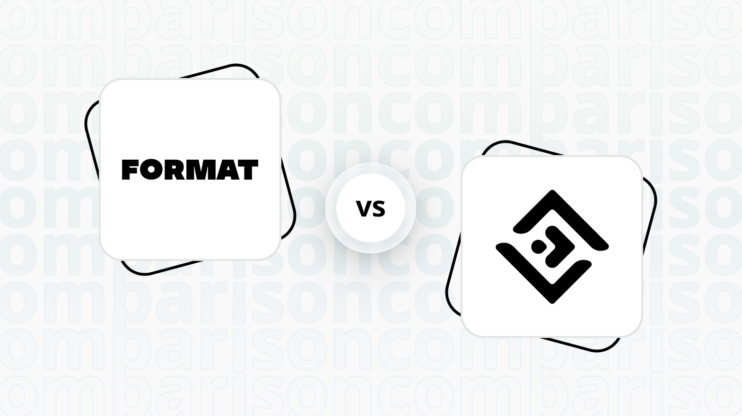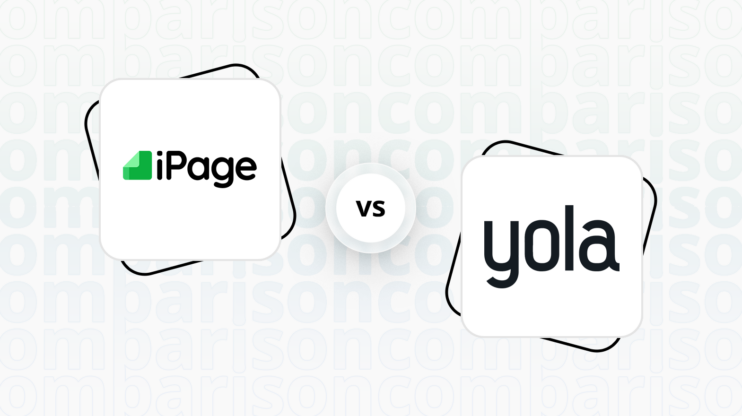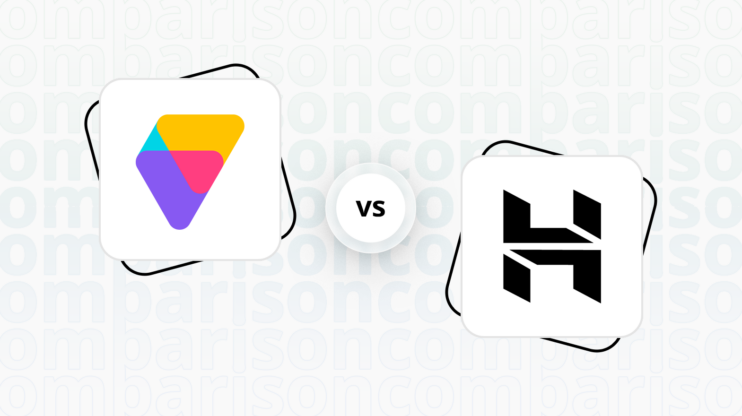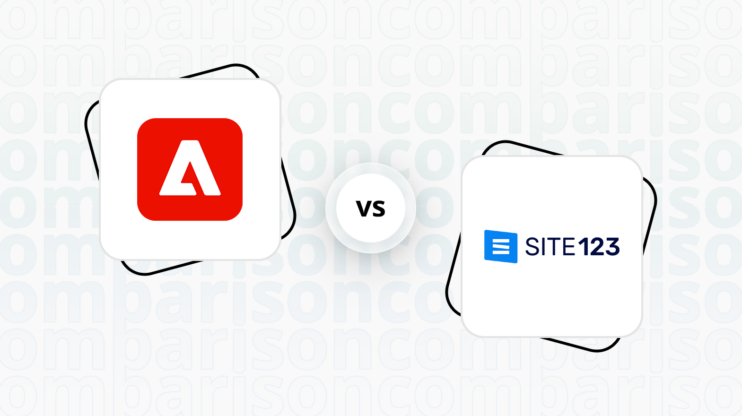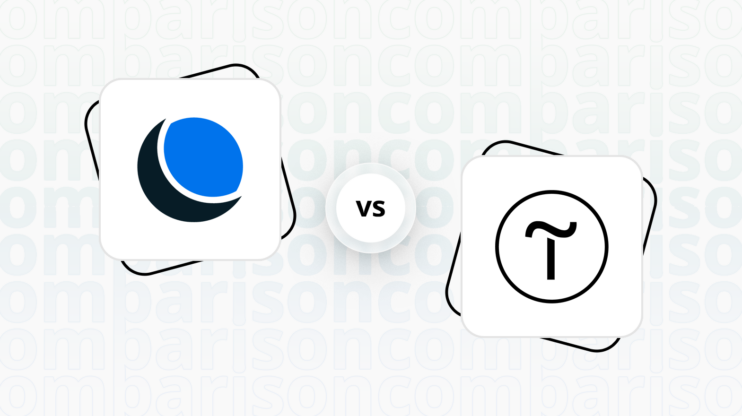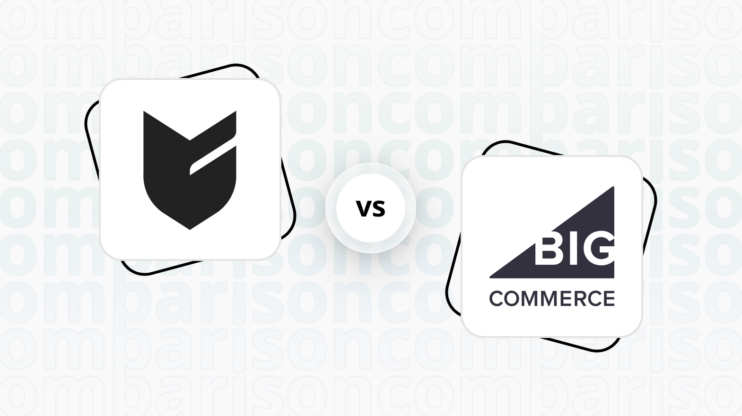Final verdict
Shopify and Carrd cater to different needs, making them suitable for distinct user bases.
-
Shopify (Overall Grade: 8.1/10)
is a powerful ecommerce platform designed for businesses looking to establish and grow their online stores. It offers a comprehensive set of features, including advanced inventory management, multi-channel selling, and detailed analytics. Shopify’s robust security measures and extensive range of plugins and integrations make it a top choice for serious online retailers. When comparing Shopify vs Carrd, Shopify stands out for its ecommerce capabilities and scalability. -
Carrd (Overall Grade: 6.1/10)
excels in simplicity and ease of use, making it ideal for individuals and small businesses looking to create single-page websites quickly and efficiently. Its user-friendly interface, affordable pricing, and attractive templates are perfect for personal profiles, landing pages, and portfolios. However, Carrd’s limited ecommerce features and lack of advanced functionalities make it less suitable for larger-scale online businesses. In the Shopify vs Carrd comparison, Carrd is best for users who prioritize ease of use and affordability over extensive ecommerce capabilities.

|

|
|
|---|---|---|
|
Design functionalities & templates |
8.2 |
7.5 |
|
Ease of use |
7.5 |
9.0 |
|
Ecommerce |
9.2 |
3.5 |
|
Website Editors |
7.9 |
7.0 |
|
Product testing options |
8.1 |
6.0 |
|
Price |
8.2 |
8.9 |
|
Hosting quality |
9.0 |
5.0 |
|
Website speed optimization |
7.8 |
8.2 |
|
Plugins and integrations |
8.7 |
5.8 |
|
Marketing features |
8.8 |
5.8 |
|
Customer support |
8.6 |
6.2 |
|
Security |
9.0 |
7.6 |
|
AI capabilities |
7.9 |
0.0 |
|
User Management |
6.5 |
4.3 |
Best for ecommerce
 9.2
9.2
 3.5
3.5
Verdict
: Shopify is the clear winner for ecommerce, offering a robust set of features tailored for online businesses, while Carrd is more suited for simple, one-page websites with basic ecommerce needs.
-
Shopify
: With a score of 9.2, Shopify excels in ecommerce with its comprehensive store builder, multiple payment gateways, advanced inventory management, and detailed analytics. It is ideal for businesses looking to scale and manage a large volume of products. Shopify’s extensive library of apps and features like Augmented Reality further enhance its ecommerce capabilities. -
Carrd
: Scoring 3.5, Carrd is designed for simplicity and ease of use, making it suitable for personal profiles, landing pages, and small projects. Its ecommerce functionalities are limited and rely on third-party integrations for payment processing and product listings. Carrd is best for users who need a quick and affordable solution for basic online presence rather than a full-fledged ecommerce platform.
Best for informational & business websites
 6.8
6.8
 7.9
7.9
Verdict
: Carrd is the better choice for creating simple, single-page informational websites, while Shopify, though capable, is more suited for ecommerce-focused sites.
-
Shopify
: Shopify, with a score of 6.8, is primarily an ecommerce platform. While it can be used for informational websites, its features are more geared towards online stores. The platform offers professional templates and robust tools for managing products, payments, and orders, but may feel overly complex for simple informational needs. -
Carrd
: Carrd, scoring 7.9, excels in creating fully responsive, single-page websites. Its simplicity and user-friendly interface make it ideal for personal profiles, landing pages, and small business sites. Carrd offers a variety of templates and customization options, making it easy to create attractive and functional websites without extensive web development skills. When comparing Shopify vs Carrd, Carrd stands out for its ease of use and affordability, making it a great choice for those looking to establish an online presence quickly and efficiently.
Detailed comparison
Design functionalities & templates
Design FunctionalitiesRepresents how well each platform allows for creative design and customization of websites.Score Components:
- Template Variety (30%): Range and quality of design templates.
- Customization (30%): Flexibility and options for design alterations.
- User Interface (20%): Ease and intuitiveness of the design process.
- Responsiveness (10%): Adaptability to different devices and screen sizes.
- Innovation (10%): Unique design features and tools.
 8.2
8.2
 7.5
7.5
🏆
Winner: Shopify.
If you’re looking for a platform that offers more professional and ecommerce-focused templates, Shopify is the preferred choice.
Shopify’s templates are sleek and professional, ideal for ecommerce sites. They offer a sophisticated look with a focus on online stores. While the free template selection is not large, Shopify’s premium theme store provides a variety of industry-specific options, offering advanced features for a strong brand presence.
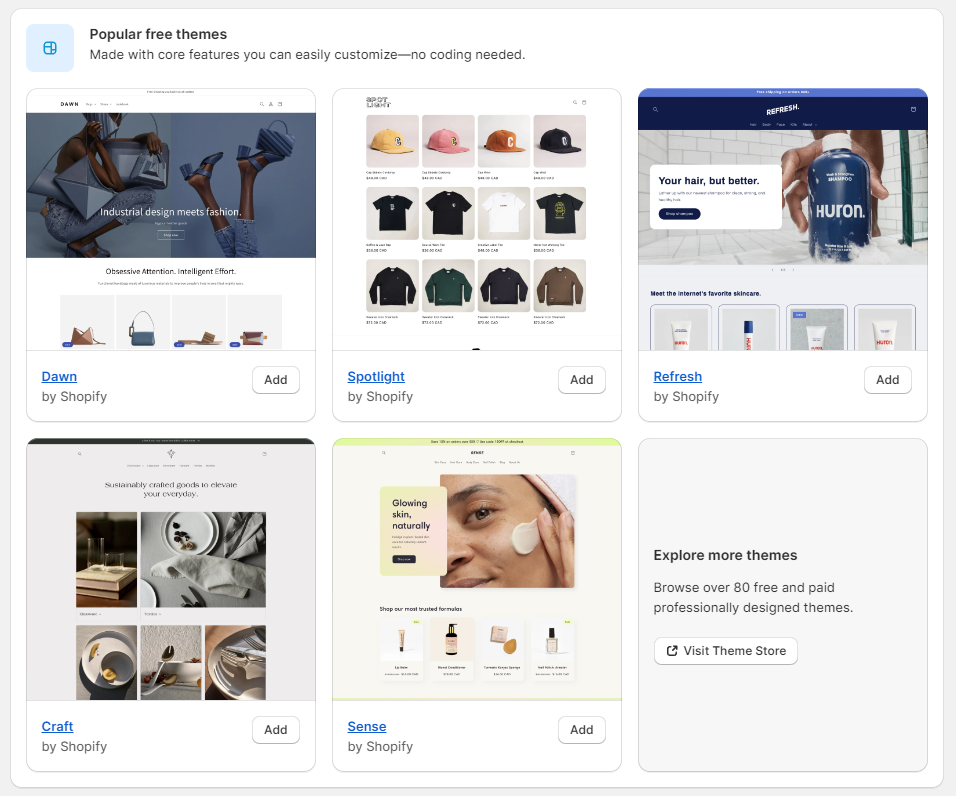
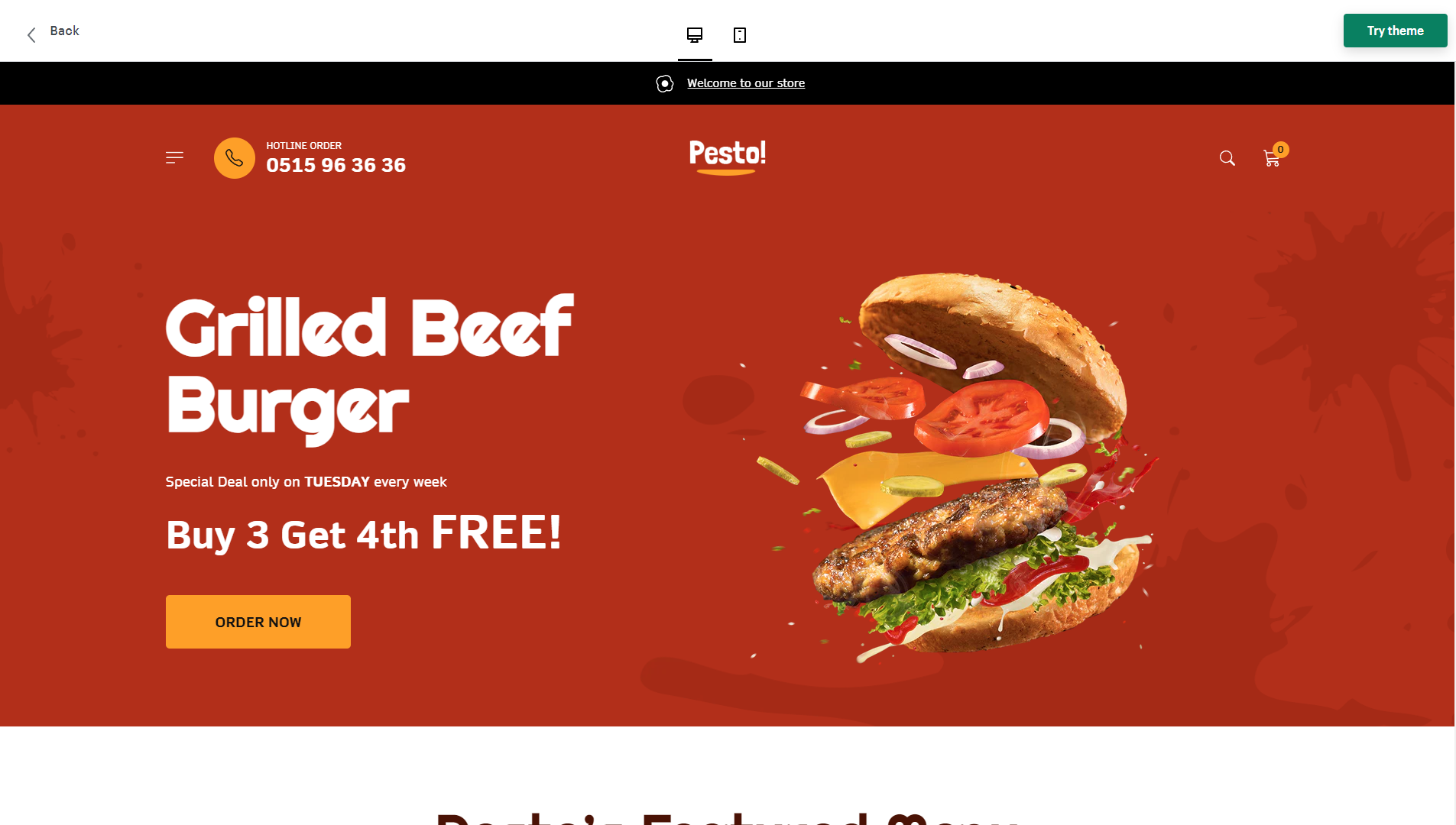
Compared to Shopify, Carrd is a versatile platform that offers a wide variety of templates and designs, catering to different needs and preferences. Users can choose from a broad selection of themes, ranging from simple and minimalist to complex and dynamic layouts, ensuring there’s something for everyone.


Get a head start on website creation with AI
Create a custom website tailored to your business needs 10X faster with 10Web AI Website Builder!
Ease of use
Ease of useReflects the platform’s overall user-friendliness.Score
Components:
- Learning curve (40%): Quickness and ease of getting started.
- Interface design (30%): Simplicity and intuitiveness of layout.
- User guidance (20%): Quality of tutorials and support.
- Flexibility (10%): Adaptability to various user skills.
 7.5
7.5
 9.0
9.0
🏆 Winner: Carrd
. Scoring a solid 9.0, Carrd stands out for its simplicity and user-friendly interface, making it exceptionally easy for beginners to create and manage their websites. Shopify, with a score of 7.5, offers a robust platform but with a steeper learning curve, especially for those new to ecommerce. If ease of use is a priority, Carrd is the clear winner in this category.
Learning Resources
🏆 Winner: Shopify
. While both platforms offer solid learning resources, Shopify goes a step further with its wide array of detailed tutorials and active community forums, making it easier for users to learn and adapt.
For ecommerce
EcommerceMeasures the platform’s effectiveness in supporting online business activities.Score Components:
- Ecommerce themes and templates (20%): Variety and design of templates.
- Product management (25%): Ease of managing and organizing products.
- Payment options (25%): Variety and convenience of payment methods.
- Ecommerce features (20%): Features for managing an ecommerce store.
- Integration (10%): Compatibility with external e-commerce tools and services.
 9.2
9.2
 3.5
3.5
When it comes to ecommerce, Shopify is a clear leader with a score of 9.2, while Carrd lags behind with a score of 3.5. Shopify is a dedicated ecommerce platform offering a comprehensive set of features for online businesses, including a comprehensive store builder, Shopify Payments and other gateways, advanced inventory management, multi-channel selling, abandoned cart recovery, and detailed analytics and reporting.
On the other hand, Carrd is primarily designed as a simple, lightweight platform for building one-page websites and does not inherently offer robust ecommerce features out of the box. It’s best suited for projects like portfolios, landing pages, or small personal sites. For users looking to incorporate ecommerce functionalities, they would need to integrate third-party services or use external links to platforms like Etsy or Shopify. Carrd’s ecommerce features are limited to Paypal and Stripe Integration, external Widgets integrations, and basic product listing options.
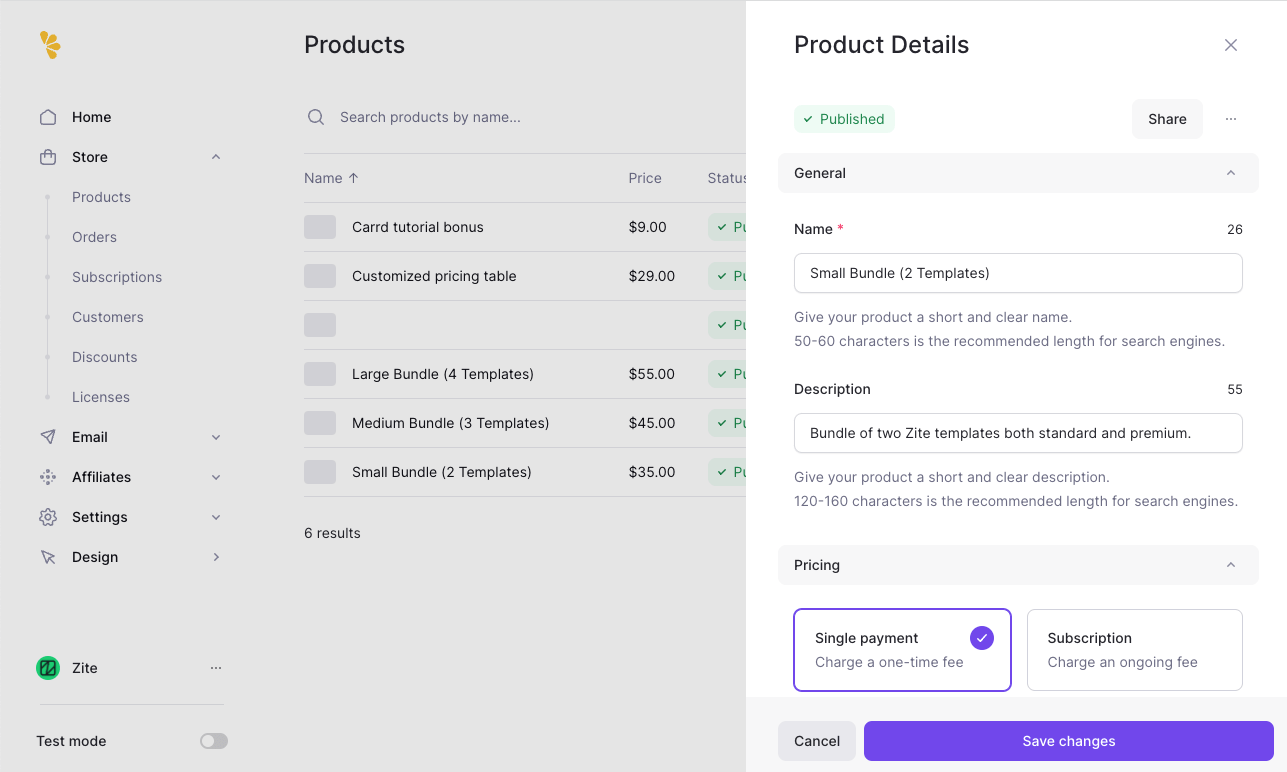
Ecommerce themes & templates
In terms of ecommerce themes and templates, Shopify offers about 150 modern and responsive themes for creating a virtual storefront, ensuring a good look on both desktop and mobile devices. While some themes are free, others cost between $170 to $380. Carrd, on the other hand, provides a selection of 14 e-commerce templates aimed at users looking to quickly launch online stores for products ranging from e-books to physical goods. These templates are crafted with a focus on simplicity and conversion optimization, featuring designs that vary from dark themes to minimalist aesthetics. They are priced starting at $19 or $25, depending on the template, and require a Pro Standard account or higher due to the use of advanced elements and widgets.
Product page customization
When it comes to product page customization, Shopify has a limit of three options per product, totaling 100 unique variations. This limit may not pose a significant constraint, and it is suggested that for products with numerous options, creating separate listings on Shopify can be a more manageable approach. While Shopify offers titles, descriptions, and image galleries with zoom effects, customization options like adding ribbons, size charts, and wishlists are not as straightforward. However, Shopify distinguishes itself with additional features through its extensive library of extra apps, offering functionalities like reviews, Facebook stores, eBay item importers, and a unique Augmented Reality feature for an enhanced customer experience. Carrd offers a streamlined approach to ecommerce product page customization, primarily through integrations with third-party platforms such as Stripe, Lemon Squeezy, and Gumroad. Users can create product pages within Carrd by adding product details like name, description, image, and price, and then integrate a checkout button using Carrd’s Widget element for platforms like Stripe. Users can integrate third-party services for ecommerce functionalities, but the customization possibilities for product pages would then depend on the capabilities of those external platforms.
Payment processing
In terms of payment processing, Shopify offers payments with typical charges of 2.9% + 30¢ per online transaction on basic plans, and lower fees for higher-tier plans. However, it adds extra fees for using other payment gateways. Shopify Payments is Shopify’s own payment processing gateway. It allows merchants to accept credit card payments directly on their store without having to integrate third-party payment providers. This simplifies the payment process, reduces transaction fees, and streamlines the handling of finances. Carrd allows for payment-enabled forms for Pro Plus users or higher, integrating with Stripe Checkout for payment processing. This setup enables creating forms for various transactions like order forms or paid email lists. The process requires setting up the payment through Stripe, either via a preconfigured price or a custom price, and entering Stripe API keys. There’s no direct mention of Carrd charging commissions or offering POS capabilities within this documentation. For payment gateways, it specifically supports Stripe and Paypal.
In conclusion, while Carrd may be a suitable choice for simple, one-page websites with basic ecommerce needs, Shopify is a more robust and comprehensive solution for businesses looking to establish and grow their online stores.
Website Editors
Website EditorsEvaluates the platforms’ website building and editing capabilities.Score Components:
- Customization tools (40%): Range and power of editing features.
- Editor usability (30%): User experience within the editor.
- Design flexibility (20%): Freedom in layout and design changes.
- Update and maintenance ease (10%): Simplicity of updating and maintaining the site.
 7.9
7.9
 7.0
7.0
🏆
Winner: Shopify
. Shopify’s editor, with a score of 7.9, excels in providing a streamlined, ecommerce-focused editing experience. It’s particularly beneficial for users who prioritize efficient management of online stores. The editor is straightforward, making it easy to add products, manage inventory, and set up payment methods. Shopify’s editor is optimized for sales and business growth, with built-in tools specifically designed for ecommerce businesses.
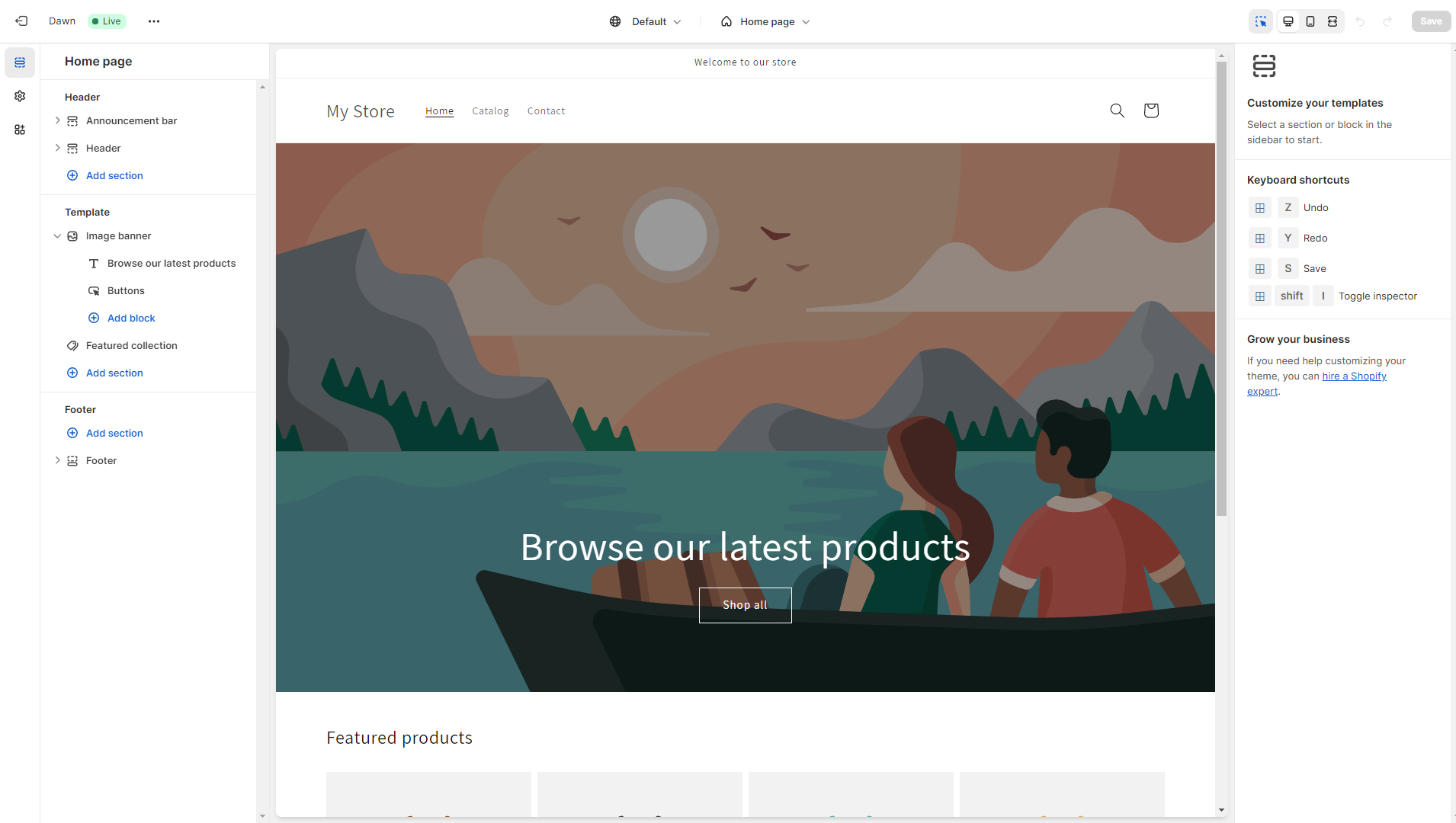
Carrd’s website builder editor, scoring 7.0, is designed for simplicity and efficiency, catering primarily to users looking to create single-page websites. It offers a user-friendly interface that allows for easy drag-and-drop functionality, enabling users to add, customize, and position elements such as text, images, buttons, and forms with minimal effort. The editor also provides a range of pre-designed templates and responsive design options, ensuring that websites look professional and work seamlessly across various devices.
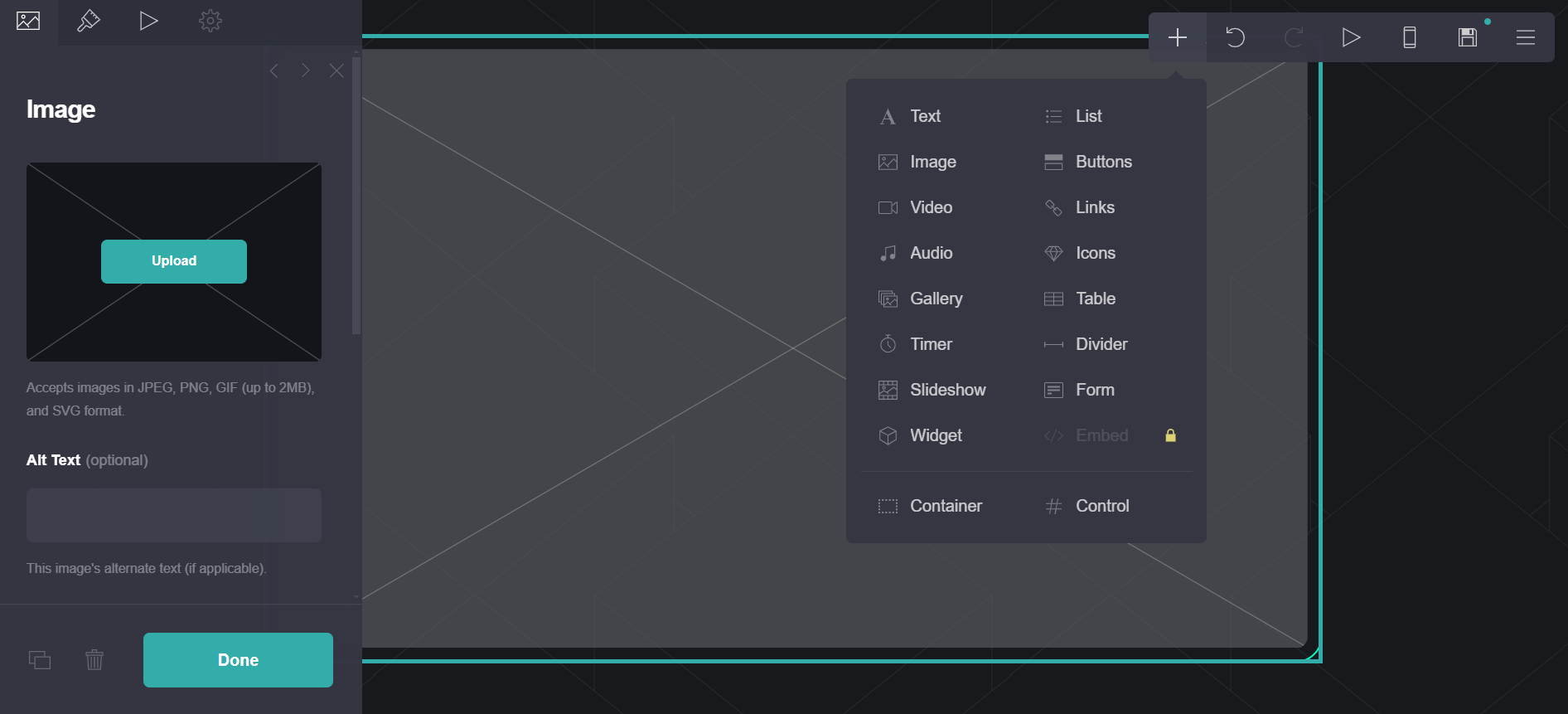
Mobile editor/app
 8.0
8.0
 5.5
5.5
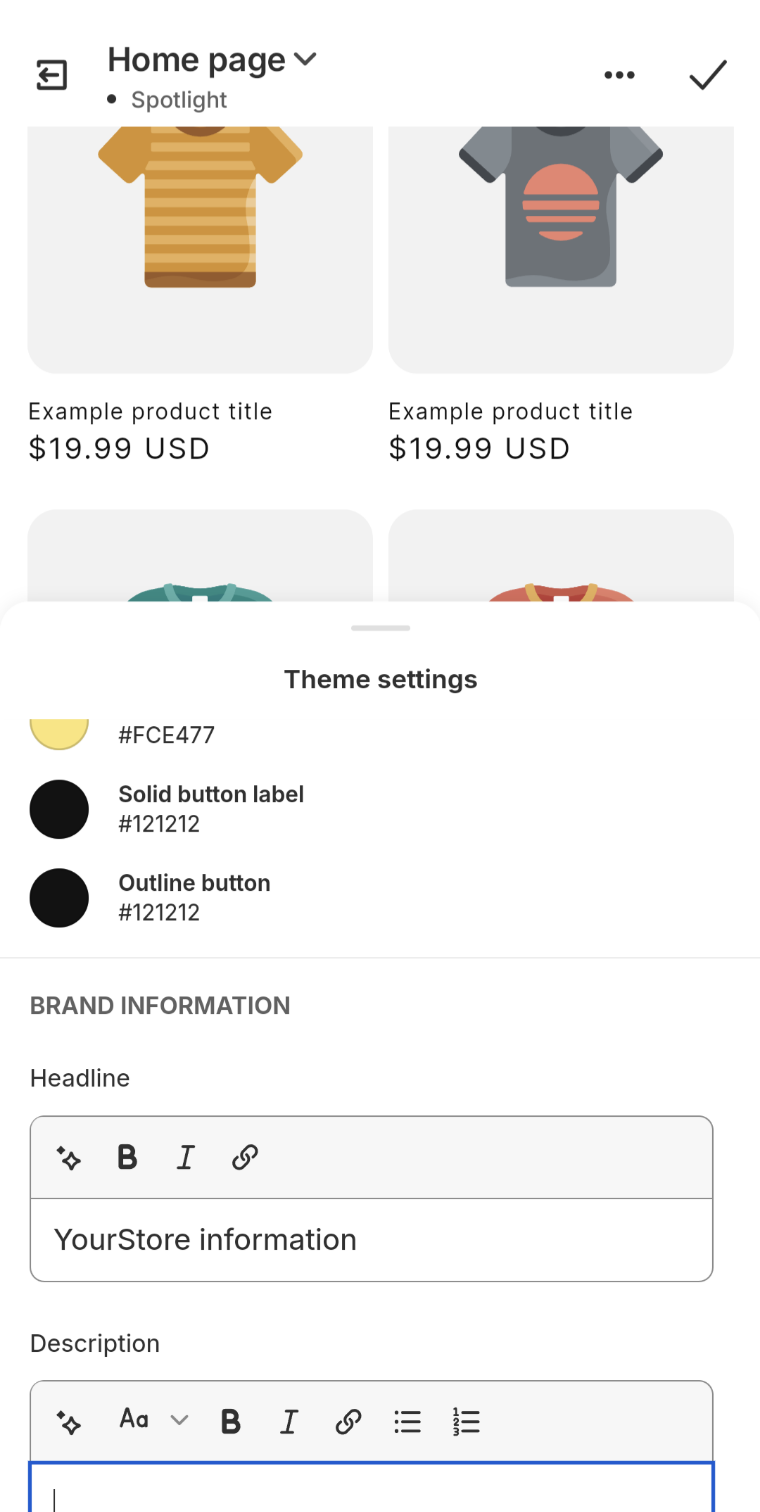
🏆
Winner: Shopify
. Both Shopify and Carrd offer mobile editing capabilities, but they cater to different needs and skill levels. Shopify has a dedicated mobile app that allows users to manage their online store from their mobile device. This feature enables the addition, removal, editing, and rearrangement of content on the store’s website, offering convenient on-the-go adjustments to the store’s appearance and layout.
On the other hand, Carrd does not have a dedicated mobile app, but it allows users to edit their website from a mobile browser. However, this might not provide as seamless an experience as a dedicated app, and it might be more challenging to make precise adjustments on a smaller screen.
In summary, Shopify receives a higher rating due to its dedicated mobile app and the robust features it offers for managing an online store, while Carrd’s mobile editing capabilities are more limited and might be better suited for simpler, single-page websites.
Product testing options
Product Testing OptionsAssesses the options for trying out platform features before commitment.Score Components:
- Trial quality (40%): Extent and usefulness of the trial or free version.
- Feature accessibility (30%): How many features are available to test.
- Trial duration (20%): Length of the trial period.
- Ease of transition (10%): Smoothness of moving from trial to paid plans.
 8.1
8.1
 6.0
6.0
Overall Result
:
Shopify wins
. Shopify scores 8.1, offering a 14-day free trial with access to all features, while Carrd scores 6.0, offering a 7-day free trial with limited access to premium features. Neither platform offers a free version, but Shopify’s trial period is twice as long as Carrd’s, and Shopify allows for a more comprehensive testing of premium features.

|

|
|
|---|---|---|
|
Free Plan |
No | No |
|
Trial Duration |
14 days |
7 days |
|
Testing Premium Features |
All features during free trial |
Premium features during free trial |
|
Money Back Guarantee |
No (14-day free trial) | No |
Price
PriceLooks at the cost-effectiveness and value for money of each platform.Score Components:
- Plan value (40%): What each pricing tier offers.
- Transparency and clarity (30%): Clearness of pricing structures.
- Flexibility of plans (20%): Range of options to suit different budgets.
- Hidden costs (10%): Additional expenses not included in the plan.
 8.2
8.2
 8.9
8.9
Carrd offers more affordable options, but Shopify’s features are more refined, especially for larger-scale ecommerce operations.

|

|
|
|---|---|---|
|
$0-$1 |
No offering at this amount. |
Pro Lite ($0.75/month): Basic features suitable for simple, personal websites. Up to 3 1-page websites. Value for price: 6.0 |
|
$1-$3 |
No offering at this amount. |
Pro Standard ($1.58/month): Offers more features and flexibility, ideal for professional profiles and small projects. Up to 10 1-page websites. Value for price: 7.5 |
|
$3-$10 |
No offering at this amount. |
Pro Plus ($4.08/month): Enhanced features for more complex sites, including additional customization options. Up to 25 1-page websites. Value for price: 8.5 |
|
$20-$30 |
Shopify Basic ($29/month): Unlimited products, 2.9% + 30¢ card fee with Shopify payments, Extra 2% gateway fee without Shopify Payments, Abandoned cart recovery, Automated sales tax, Digital products, POS Integration, 2 staff accounts. Value for price: 8.0 |
No offering at this amount. |
|
$70-$80 |
Shopify Standard ($79/month): Lower card fees (2.6% + 30¢), Gift cards, Professional reports, 5 staff accounts. Value for price: 8.5 |
No offering at this amount. |
|
$200+ |
Advanced Shopify ($299/month): Lowest card fees (2.49% + 30¢), Advanced report builder, Real-time carrier shipping, Up to 15 staff accounts Value for price: 8.8 |
No offering at this amount. |
location. As a result in rare cases the prices displayed here can differ from the ones you see on their
websites.
Hosting quality
Hosting
qualityExamines the reliability and performance of the hosting solutions.Score Components:
- Uptime (40%): Consistency and reliability of website availability.
- Speed (30%): Loading times and performance.
- Bandwidth and storage (20%): Sufficiency of resources provided.
- Data centers (10%): Quality and distribution of hosting infrastructure.
 9.0
9.0
 5.0
5.0
Winner: Shopify
. Shopify’s proprietary cloud-based hosting, 99.99% uptime guarantee, and 5 global data centers make it a superior choice for reliable and high-performance hosting. Carrd, while offering shared hosting, lacks transparency in its uptime, uptime guarantee, and data center locations, which are crucial factors for website reliability and performance.

|

|
|
|---|---|---|
|
Do they offer hosting? |
Yes, included in all paid plans |
Yes, included in all paid plans |
|
Data Centers: |
5 globally: USA (Ashburn, Virginia; Santa Clara, California), Canada (Toronto, Ontario), Ireland (Dublin), and Singapore |
Carrd doesn’t publicly disclose any information about its data centers |
|
Type of hosting: |
Proprietary cloud-based hosting |
Shared Hosting |
|
Uptime: |
99.99% |
Carrd.co does not provide any statistics on uptime |
|
Uptime Guarantee: |
Yes, 99.99% |
Carrd.co does not provide any uptime guarantee |
Website Speed Optimization
Website Speed OptimizationEvaluates optimization of website loading timesScore Components:
- PageSpeed Score (30%): Google’s score indicating performance optimization.
- Loading Time (30%): The average time until a website is fully interactive.
- Mobile Optimization (15%): Optimization effectiveness for mobile devices.
- Resource Optimization (15%): Optimizing images, scripts, and other heavy resources.
- CDN Usage (10%): Use of CDN to enhance speed across geolocations.
 7.8
7.8
 8.2
8.2
🏆 Winner: Carrd
Both Shopify and Carrd prioritize website performance and page speed, but Carrd has a slight edge in this category due to its simplicity and use of caching and Cloudflare CDN.

|

|
|
|---|---|---|
|
Focus |
App optimization, Google AMP |
Mobile responsive design, Caching, Cloudflare CDN |
|
Performance Tools |
Google Lighthouse, PageSpeed Insights |
Not disclosed |
|
Key Strategies |
App efficiency, Theme optimization |
Mobile responsive design, Caching, Cloudflare CDN |
|
Load Times |
Varies widely, dependent on optimization |
Minimal due to simplicity of websites |
|
Page Speed Scores Range |
Scores vary; influenced by apps, images |
Expected to be high due to simplicity of websites |
|
Core Web Vitals Improvement |
Emphasis on LCP, FID, CLS improvements |
Not disclosed |
Carrd, a platform for building fully responsive, single-page websites, focuses on mobile responsive design, caching, and Cloudflare CDN for speed optimization. Given the simplicity of websites built with Carrd, load times are expected to be minimal, and page speed scores are expected to be high. However, Carrd does not disclose any information related to Core web vitals improvements.
Shopify, an ecommerce website builder and hosting platform, places a strong emphasis on app efficiency and theme optimization for speed optimization. Shopify’s load times and PageSpeed score ranges vary widely and are dependent on optimization. Shopify also emphasizes on LCP, FID, CLS improvements for Core Web Vital improvements.
Get a head start on website creation with AI
Create a custom website tailored to your business needs 10X faster with 10Web AI Website Builder!
Plugins and integrations
Plugins and integrationsMeasures the range and effectiveness of additional plugins and integrations.Score Components:
- Variety of options (40%): Range of available add-ons.
- Integration smoothness (30%): Ease of integrating plugins into the site.
- Quality of plugins (20%): Functionality and reliability of the options.
- Custom integration capabilities (10%): Support for custom or third-party integrations.
 8.7
8.7
 5.8
5.8
🏆 Winner: Shopify.
Shopify scores 8.7, leading the way with its extensive range of ecommerce-focused plugins and seamless integrations. It’s a powerhouse for adding functionalities that scale with your business. Carrd, with a score of 5.8, offers a variety of plugins too, but they are more focused on enhancing user interactions and content presentation.
It’s worth mentioning that Carrd offers both free and paid plugins, providing flexibility for users with different budget constraints.
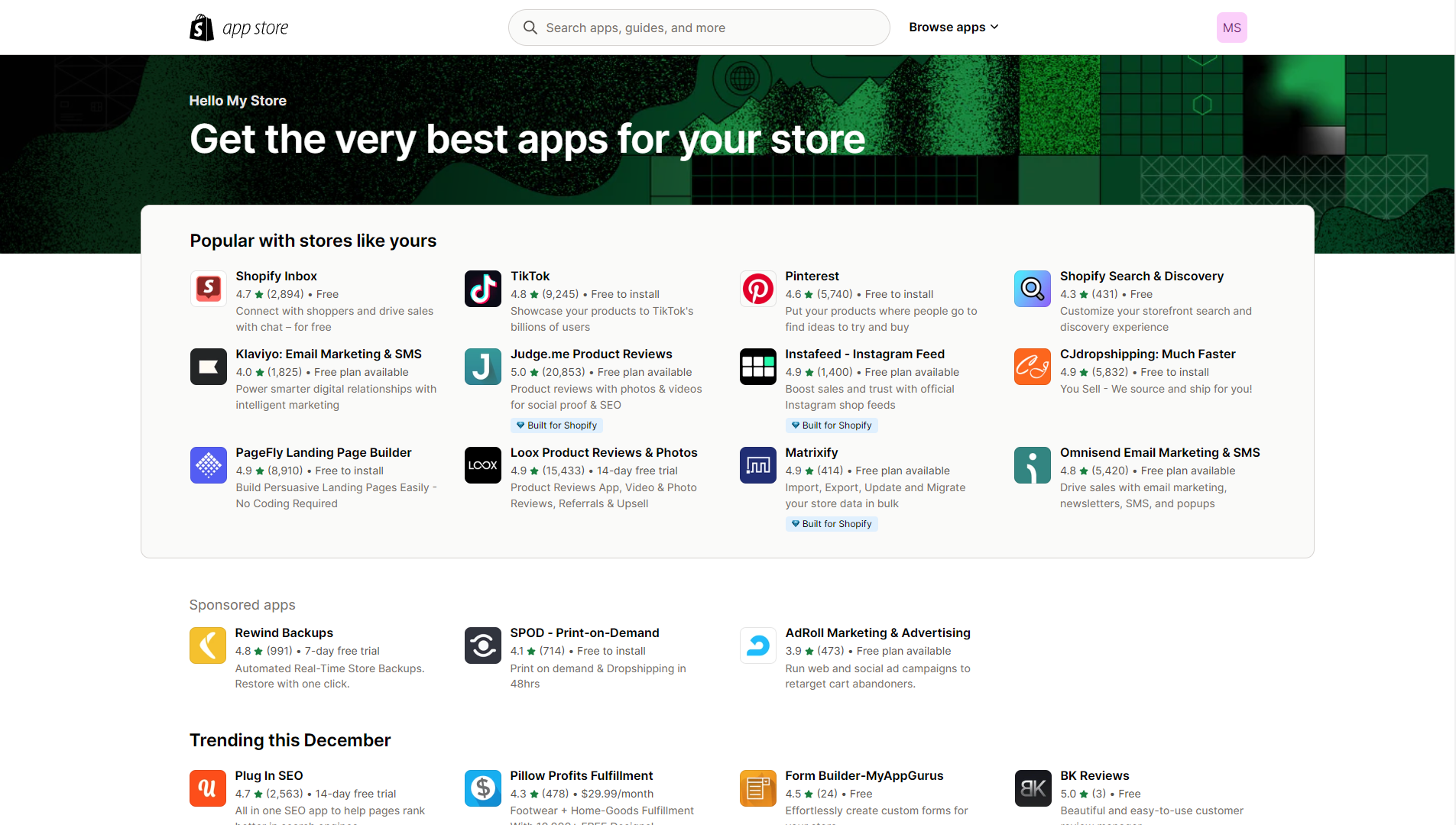
Marketing Features
Design FunctionalitiesRepresents how well each platform allows for creative design and customization of websites.Score Components:
- Template Variety (30%): Range and quality of design templates.
- Customization (30%): Flexibility and options for design alterations.
- User Interface (20%): Ease and intuitiveness of the design process.
- Responsiveness (10%): Adaptability to different devices and screen sizes.
- Innovation (10%): Unique design features and tools.
 8.8
8.8
 5.8
5.8
🏆
Overall Winner: Shopify
. Shopify stands out for its more advanced ecommerce-focused marketing tools, especially in analytics and ad campaign management. Carrd, while offering basic marketing features, relies on third-party integrations for more advanced functionalities.

|

|
|
|---|---|---|
|
SEO Tools |
|
|
|
Email Marketing |
|
Yes (through third-party integrations) |
|
Blogging |
|
|
|
Social Media Integration |
Advanced integration for selling directly on social platforms |
Basic social media integration |
|
Analytics and Reporting |
Detailed analytics for in-depth insights |
Basic analytics through Google Analytics integration |
|
Ads and Promotions |
Google Ads integration; sophisticated ad campaign management |
Yes (through third-party integrations) |
Customer Support
Customer supportEvaluates the quality and availability of support options.Score Components:
- Response time (40%): Speed of support responses.
- Support quality (30%): Effectiveness and helpfulness of the support.
- Availability (20%): Range of support channels (phone, chat, email).
- Resource richness (10%): Quality of self-help and educational materials.
 8.6
8.6
 6.2
6.2
🏆 Winner: Shopify
. When comparing Shopify vs Carrd, Shopify stands out with its comprehensive 24/7 customer support through chat, email, and phone. Shopify also offers a wealth of tutorials, an extensive community forum, and a valuable marketing blog, making it easier for users to find solutions and grow their businesses. For enterprise-level businesses, Shopify provides dedicated account managers, priority support, and additional resources to ensure success.
Carrd, on the other hand, offers 24/7 email support with typically quick response times, usually within 24 hours. While Carrd’s support is efficient for its user base, it lacks the extensive resources and enterprise-level support that Shopify provides. This makes Shopify the better choice for users who require robust and readily available customer support.
Security
SecurityLooks at the platforms’ security measures and data protection.Score Components:
- Data protection (40%): Safeguards for user and customer data.
- SSL and encryption (30%): Implementation of secure connections.
- Compliance (20%): Adherence to industry security standards.
- Regular updates (10%): Frequency of security updates and patches.
 9.0
9.0
 7.6
7.6
🏆
Winner: Shopify
. Shopify’s security measures are more comprehensive than Carrd’s, with a focus on data privacy, secure infrastructure, encryption, and limited access. Shopify also complies with data privacy regulations, practices data minimization, and ensures user control and transparency. Additional security measures include two-factor authentication, regular audits, and a dedicated incident response team.
Although Carrd, while offering SSL for all sites and prioritizing data security and encryption, does not provide the same level of security measures as Shopify. It collects personal information and uses cookies for website operation, data gathering, and enhancing user experiences. Carrd does not sell personal information but may share it with vendors and service providers for business operations. It implements measures to protect personal information online and offline, though no internet transmission is fully secure. Users have privacy choices, including opting out of marketing communications and requesting personal information modifications.
AI Capabilities
AI capabilitiesMeasures the effectiveness of AI-driven features and tools.Score Components:
- Automation efficiency (40%): Impact of AI on streamlining processes.
- Personalization (30%): AI-driven customization for users or customers.
- AI-Assisted design (20%): Role of AI in website design and functionality.
- Data analysis (10%): Use of AI in interpreting user data and analytics.
 7.9
7.9
 0.0
0.0

|

|
|
|---|---|---|
|
Personalized Design |
Shopify AI Builder offers personalized design suggestions |
|
|
SEO Optimization |
AI-driven recommendations for better search engine visibility |
|
|
Customer Behavior Analysis |
Advanced analytics to understand customer preferences |
|
|
Sales Predictions |
AI-powered sales forecasting tools |
|
|
Inventory Management |
AI tools to assist in efficient inventory handling |
|
|
Content Generation |
AI-assisted content generation |
|
🏆 Winner: Shopify
. Shopify, with a score of 7.9, utilizes AI mainly to enhance the ecommerce experience. Its AI features focus on customer behavior analysis, personalized shopping experiences, inventory management, and sales predictions. Shopify’s AI also assists in content generation, providing a creative partner to help users find the right words to tell their story.
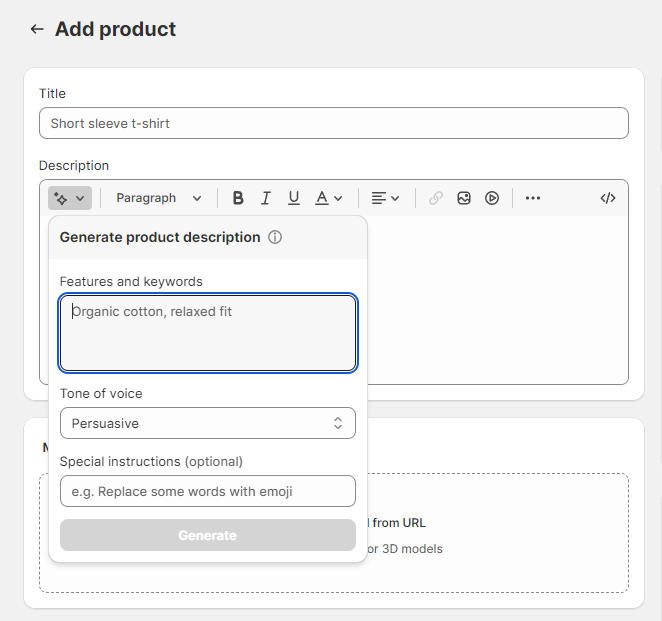
Carrd, on the other hand, does not have any AI capabilities. This means that while Carrd can still be a good choice for simple, single-page websites, it may not offer the same level of assistance or automation as Shopify in terms of content generation, SEO optimization, and ecommerce features.
User Management
User ManagementAssesses the platforms’ capabilities in managing user roles, permissions, and accessibility.Score Components:
- Role Customization (40%): Flexibility in creating and defining user roles and
permissions. - Ease of Management (30%): User interface and tools for managing users.
- Access Control (20%): Effectiveness of access control measures for different user
levels. - Scalability (10%): Ability to manage a growing number of users efficiently.
 6.5
6.5
 4.3
4.3
🏆 Winner: Shopify
. Shopify’s user management system is more detailed and structured, offering different roles with varying access levels. On the other hand, Carrd is primarily designed for individual use or small teams, with each account managing its own sites.
Shopify User Roles and Access Levels:
| Role | Description | Access Highlights |
|---|---|---|
| Store Owner | Full control over store | Manage products, orders, discounts, payments, apps, settings. Create and manage staff accounts. |
| Staff | Configurable access by owner |
Add/edit products, manage orders, fulfill orders, manage customers, update content. Access level can be customized by the owner. |
| Collaborator | Limited access for external partners | View and manage specific sections like blog or product categories. Cannot access full store settings. |
Carrd, traditionally, is managed by a single account holder with full control. The platform introduced a Team feature to allow multiple users to collaborate, but the specifics of access levels and permissions for collaborators, if available, are less detailed but generally include editing capabilities.
Additional Features

|

|
|
|---|---|---|
|
SSL Certificate |
|
|
|
Custom Domain |
|
|
|
Free Custom Domain Included |
|
|
|
International Domains |
|
|
|
Mobile Responsive |
|
|
|
Page Speed |
|
|
|
Website Builder Mobile App |
|
|
|
Convert a Website To An App |
|
|
|
Website Analytics |
|
|
|
Multilingual Sites |
|
|
|
Multiple Users |
|
|
User Feedback
Shopify’s slightly higher rating on G2 Crowd can be largely attributed to its specialization in ecommerce. Its comprehensive features, ease of use, and robust customer support cater specifically to online businesses, leading to high user satisfaction among those seeking a dedicated ecommerce solution.
Users overwhelmingly praise Carrd for its user-friendly interface, excellent customer support, and attractive templates, making website creation effortless and enjoyable. The drag-and-drop builder, affordability, and mobile-friendly designs are highlighted as significant benefits. However, some users express limitations, such as the inability to create multi-page websites or a desire for more design options. Overall, Carrd is praised for its affordability, ease of use, and suitability for creating quick, simple webpages.
The making of this blog
We followed a clear, step-by-step process to write and research this article.
FAQ
Can I use Carrd for ecommerce like I can with Shopify?
Is Carrd easier to use than Shopify?
Which platform is better for single-page websites, Shopify or Carrd?
How do the pricing plans of Shopify and Carrd compare?
Which platform offers better customer support, Shopify or Carrd?
Can I build a multi-page website with Carrd?










